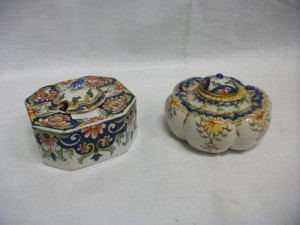 An interesting collection of 18th/19th Delft pottery will add some Dutch colour to Unique Auction’s two day Fine Antiques, Art and Collectors auction on the 26th-27th October. The collection includes polychrome pieces as well as early blue and white chargers.
An interesting collection of 18th/19th Delft pottery will add some Dutch colour to Unique Auction’s two day Fine Antiques, Art and Collectors auction on the 26th-27th October. The collection includes polychrome pieces as well as early blue and white chargers.
About Delft and Delftware
The earliest tin-glazed pottery in the Netherlands was made in Antwerp by Guido da Savino in 1512. The manufacture of painted pottery may have spread from the south to the northern Netherlands in the 1560s. It was made in Middelburg and Haarlem in the 1570s and in Amsterdam in the 1580s. Much of the finer work was produced in Delft, but simple everyday tin-glazed pottery was made in places such as Gouda, Rotterdam, Amsterdam and Dordrecht.
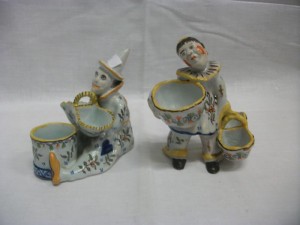 The main period of tin-glaze pottery in the Netherlands was 1640-1740. From about 1640 Delft potters began using personal monograms and distinctive factory marks. The Guild of St Luke, to which painters in all media had to belong, admitted ten master potters in the thirty years between 1610 and 1640 and twenty in the nine years 1651 to 1660. In 1654 a gunpowder explosion in Delft destroyed many breweries and as the brewing industry was in decline they became available to pottery makers looking for larger premises; some retained the old brewery names, e.g. The Double Tankard, The Young Moors’ Head and The Three Bells.
The main period of tin-glaze pottery in the Netherlands was 1640-1740. From about 1640 Delft potters began using personal monograms and distinctive factory marks. The Guild of St Luke, to which painters in all media had to belong, admitted ten master potters in the thirty years between 1610 and 1640 and twenty in the nine years 1651 to 1660. In 1654 a gunpowder explosion in Delft destroyed many breweries and as the brewing industry was in decline they became available to pottery makers looking for larger premises; some retained the old brewery names, e.g. The Double Tankard, The Young Moors’ Head and The Three Bells.
The use of marl, a type of clay rich in calcium compounds, allowed the Dutch potters to refine their technique and to make finer items. The usual clay body of Delftware was a blend of three clays, one local, one from Tournai and one from the Rhineland.
From about 1615, the potters began to coat their pots completely in white tin glaze instead of covering only the painting surface and coating the rest with clear ceramic glaze. They then began to cover the tin-glaze with clear glaze, which gave depth to the fired surface and smoothness to cobalt blues, ultimately creating a good resemblance to porcelain.
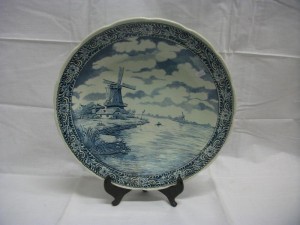
During the Dutch Golden Age, the Dutch East India Company had a lively trade with the Ea
st and imported millions of pieces of Chinese porcelain in the early 17th century. The Chinese workmanship and attention to detail impressed many. Only the richest could afford the early imports. Although Dutch potters did not immediately imitate Chinese porcelain, they began to after the death of the Wanli Emperor in 1620, when the supply to Europe was interrupted. Delftware inspired by Chinese originals persisted from about 1630 to the mid-18th century alongside European patterns.
By about 1700 several factories were using enamel colours and gilding over tin-glaze, requiring a third kiln firing at a lower temperature.
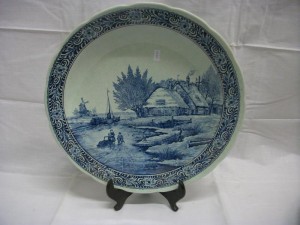
Delftware ranged from simple household items – plain white earthenware with little or no decoration – to fancy artwork. Most of the Delft factories made sets of jars, the kast-stel set. Pictorial plates were made in abundance, illustrated with religious motifs, native Dutch scenes with windmills and fishing boats, hunting scenes, landscapes and seascapes. Sets of plates were made with the words and music of songs; dessert was served on them and when the plates were clear the company started singing. The Delft potters also made tiles in vast numbers (estimated at eight hundred million) over a period of two hundred years; many Dutch houses still have tiles that were fixed in the 17th and 18th centuries.
Background information from Wikipedia.
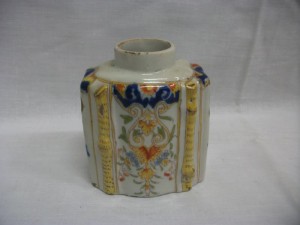 Fine Antiques & Collectors Sale Saturday & Sunday 26th & 27th October
Fine Antiques & Collectors Sale Saturday & Sunday 26th & 27th October
The Saturday & Sunday 26th & 27th October Fine Antiques & Collectors Sale starts at 9am each day. Viewing of items is from 8am on Friday 25th October and the morning of the sale. The sale will also be available online for bidding through the Sale Room. Click here to register.
About Unique Auctions
Unique Auctions are one of Lincolnshire’s leading Auction Houses offering a range of regular Antique & Collectors sales. Unique Auctions handle every aspect of probate, house, agricultural, commercial and industrial clearances.
For further information call UK +44 (0) 1522 690444 or visit https://www.unique-auctions.com
We are now accepting Delft Pottery and European Pottery etc for all future auctions. We also value Delft Pottery and European Pottery etc – please call 01522 690444 for more details.
